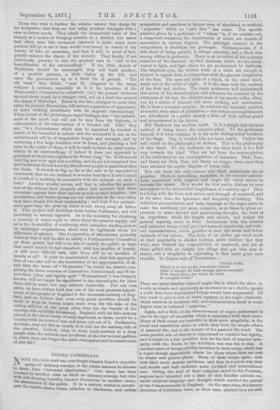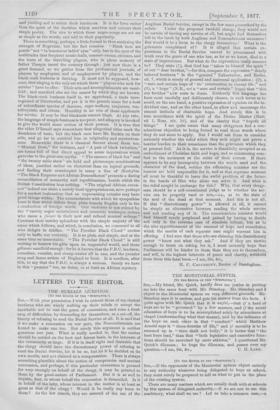NEGRO COMEDIANS.
INONE who have read can ever forget Charles Lamb's exquisite praise of chimney-sweeps, or the subtle interest he arouses in those little "innocent blacknesses." Our fancy has been touched by another class as black as chimney-sweeps, but who with self-denying humility blacken themselves in another cause, the amusement of the public. It is a curious matter to investi- gate the mystic charm which attaches to blackness, and enlists
sympathies and emotions in favour even of simulated or artificial " negroism" which no "pale face" can rouse. The specific pleasure given by a performer of " colour " is, if we mistake not, a compound sensation, the constituents of which are results of association in various degrees. The principal element in the composition is doubtless the grotesque. Grotesqueness, if it falls short of being painful, is always amusing, and a black man among whites is grotesque. There is an inversion of the ordinary relations of the features ; we find darkness where we are accus- tomed to light, aud light where we are accustomed to darkness. The brightest eyes, the whitest teeth of a white are enough in. shadow to appear dark in comparison with the general complexion of the face. The eyes and teeth of a black, on the other hand, stand out in the midst of night. It is the same with the contrast of the flesh and clothes. The negro performer well understands this secret of his attractiveness, and enhances the contrast by the whiteness of his hat, the obtrusiveness of his snowy collar, often, too, by a choice of raiment still more striking and uncommon.
He is thus a constant surprise ; he awakens the dramatic emotion of wonder, twin-sister of admiration,—his various accomplishments are introduced to a public already a little off their critical guard and prepossessed in his favour.
But blackness has another merit. It is a simple and obvious method of rising above the common-place. To the performer himself, it is what costume is to his more distinguished brethren of the Stage. Nay, it touches him yet more nearly. Carlyle has said much on the philosophy of clothes. This is the philosophy of skin itself. To the audience, on the other hand, it is a first stop towards the ideal. They are led from the contemplation of the individual to the contemplation of character. Dick, Tom, and Harry are Dick, Tom, and Harry no longer, when once they have assumed the mystic disguise of burnt cork.
Nor are these the only reasons why black performers are so popular. There is something, doubtless, in the remoter associa- tions connected with negroes and negro life which serves to increase the charm. How would the first native African he ever saw appear to the untravelled Englishman of a century ago? Here is a being with the form and stature and strength of manhood, and at the same time, the ignorance and simplicity of infancy. The indistinct pronunciation and baby-language of the negro serve to make the antithesis yet more complete, as at times he gives ex- pression to some shrewd and penetrating thought, the fruit of an experience which his tongue and accent, and indeed his general capacity, seem to belie. Intercourse with this curious and unknown being would give that sense of superiority, not with- out commiseration, which gratifies at once the worse and better instincts of our nature. The fools of an earlier age owed much of their popularity to similar feelings, adult children that they were, men without the responsibility of manhood, and yet at times gifted with an insight into things that put wise men to shame, and a simplicity in expressing it that made great men tremble. So Jaques says of Touchstone,—
" In his brain,
Which is as dry as the remainder biscuit After a voyage, he bath strange places crammed With observation, the which be vents In mangled forms."
There are many familiar tales of negro life in which the slave, in words as simple and apparently as unconscious as a child's, speaks a truth that more sophiscated beings would have suppressed. All this tends to give a sort of weird mystery to the negro character, which survives in tradition still, and communicates itself in some degree even to imitated (c negroism."
Again, not a little of the attractiveness of negro performers is due to the type of minstrelsy which is associated with their name. Many of their songs are beautiful in their mere simplicity, in the frank and unartificial strain in which they treat the simple affairs of pastoral life, and in the beauty of the pastoral life itself. The more painful side of slavery is suppressed or touched but lightly, and it might be a fair question how far the lack of popular sym- pathy with the North in the Abolition war was due to this. A. careless sense of irresponsibility breathes in their songs, which has a vague though appreciable charm for those whose lines are cast in busier and graver places. Many of their songs, again, deal
with life's more serious problems, and that in a novel way that half shocks and half enchants more civilised and conventional ears. Owing the seed of their religious creed to the Puritana, negroes have inherited not a little of that familiar attitude to- wards religious language and thought which marked the period of the Commonwealth in England. At the same time, the sterner doctrines of Calvinism were, in their case, planted in a too soft
and yielding soil to retain their harshness. It is the form rather than the spirit of the doctrine which survives and colours their simple poetry. The airs to which these negro-songs are set are as simple as the words, and add to their popularity.
There is something, perhaps, a little formal in thus analysing the strength of Negroism, but the fact remains. "Black men are pearls" not "in beauteous ladies' eyes" only, but in the eyes of the multitudes that frequent music-halls, concert-rooms, circuses, and the tents of the travelling players, who in pious memory of father Thespis travel the country through ; just now there is a great demand, so we gather from the professional journals, of players by employers, and of employment by players, and the black-cork business is thriving. It must not be supposed, how- ever, that singing is the only art which these "players who seek for service" have to offer. Their arts and accomplishments are mani- fold; and manifold also are the names by which they are known. The black-cork business itself is, we apprehend, a trade unre- cognised of Directories, and yet it is the generic name for a host of subordinate species of dancers, rope-walkers, conjurors, ven- triloquists, and others. Humility is no vice of these applicants for service. It may be that blackness cannot blush. At any rate, the language of simple business is too poor, and allegory is invoked to give the world some notion of their powers. It is true that the elder D'Israeli says somewhere that allegorical titles mark the decadence of taste, but the black men have Mr. Ruskin on their side, and go far to outrival him in originality and mysterious- ness. Meanwhile there is a classical flavour about them too. "Musical Dots," for instance, and "A pair of black twinklers," are terms full of that direct appeal to sense impressions which gave rise to the great sun-myths. "The essence of black fun" and "the twenty sable stars" are bold and picturesque combinations of ideas, justified rather on rhetorical than on logical grounds, and finding their counterpart in many a line of 2Eschylus. "The Black Emperor and African Demosthenes" presents a daring reconciliation of monarchy and republicanism, beside which the British Constitution is as nothing. "The original African cocoa- nut" indeed can claim a merely local appropriateness, save perhaps for a modest insinuation that an unpromising exterior may have good things within. The nomenclature with which we sympathise least is that which differs from plain homely English only in the i itroduction of foreign words. Our curiosity is not stirred by the " variety negro entertainers and eccentric burlesque artistes who cause a furore in their new and refined musical mélange." Contrast their tawdry splendour with the simple majesty of the name which follows, and which, in conclusion, we commend to all who delight in riddles. "The Peculiar Black Cloud" excites only to baffle our curiosity. It is so plain and simple, and at the same time so inscrutable. "The Peculiar Black Cloud" is still waiting to bestow his gifts upon an ungrateful world, and those gifts are manifold enough ; for be it known that the P.B.C. isadraw, comedian, vocalist, and stump-orator all in one, and the premier song and dance artiste of England to boot. It is needless, after this, to say that the P.B.C. is always a success. Surely we have in this " premier " too, an Asian, or at least an African mystery.































 Previous page
Previous page